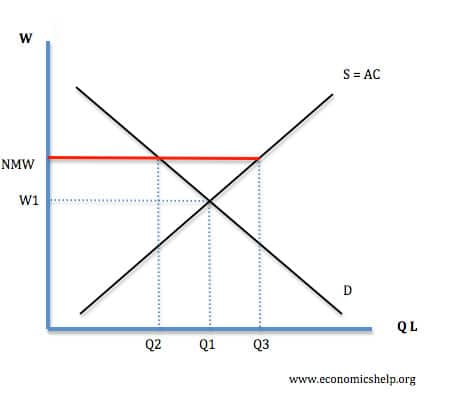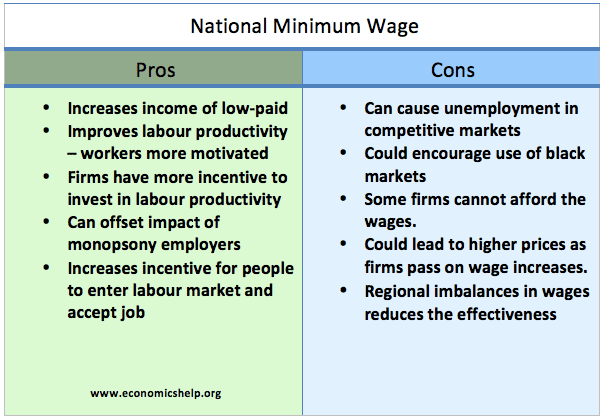A minimum wage is a legal minimum for workers. It means workers are guaranteed a certain hourly wage – helping to reduce relative poverty. However, a minimum wage could have potential disadvantages – in particular, there is the risk of creating unemployment as firms cannot afford to employ workers.
“It has always been a mystery to me to understand why a youngster is better off unemployed at $1.60 an hour than employed at $1.25.” – Milton Friedman (1966) “Minimum Wage Rates” Newsweek
1. Unemployment. If labour markets are competitive, a minimum wage could cause unemployment because firms will demand less labour, and higher wages may encourage more workers to supply their labour.
Diagram of Minimum Wage

- In the above diagram, the NMW (Wtu) has caused a fall in employment of Q1-Q2.
- The level of real wage unemployment at NMW is Q3-Q2
Firms in labour-intensive industries will be most affected. For example, hairdressers and cleaning companies will see a proportionately more significant increase in their wage bill.
Milton Friedman, a free market economist was critical of minimum wages. In 1966, he wrote a critique of the minimum wage
“Congress has just acted to increase unemployment. It did so by raising the legal minimum-wage rate from $1.25 to $1.60 an hour, effective in 1968, and extending its coverage. The result will be and must be to add to the ranks of the unemployed.”
Milton Friedman (1966) “Minimum Wage Rates” Newsweek
2. Firms may become uncompetitive. In some cases, a higher minimum wage could push up costs causing a firm to go out of business because they may not be able to afford wage costs. This might be a particular problem if the firm is competing in a global market and higher wage costs make them uncompetitive compared to low-wage cost countries. For example, a higher minimum wage may encourage firms to manufacture clothes in China or Taiwan where labour is cheaper than the UK.
3. Cost-push inflation. A minimum wage can cause cost-push inflation. This is because firms face an increase in costs which are likely to be passed on to consumers. This is even more likely if wage differentials are maintained.
4. Black market. A minimum wage may increase the number of people working on the black market so firms can avoid paying the legal minimum.
5. Poorest don’t benefit. A limitation of the minimum wage is that it doesn’t increase the incomes of the lowest income groups. This is because the poorest have to rely on benefits and are therefore not affected by minimum wages.
6. Limited impact on relative poverty. Many who benefit from the minimum wage are second income earners, and therefore the household is unlikely to be below the poverty line. A household with a single income earner just above the minimum wage is likely to be relatively poorer. But they will not benefit from the minimum wage.
See also: Advantages of Minimum Wages
Evaluation of Minimum Wages
- The effect of a min wage on unemployment is uncertain, the structure of the labour market is very important. E.g. if the labour market is a monopsony, a minimum wage may not cause unemployment.
- Empirical evidence from the US and the UK suggests that a moderate increase in the minimum wage doesn’t cause a fall in employment. Therefore the key question is how high the minimum wage can rise before causing unemployment.
- The impact of the minimum wage on wage differential is important. For example, skilled workers just above the minimum wage may feel they deserve more. Therefore, an increase in the minimum wage may lead to wage increases for all pay grades. However, increasing the minimum wage tends to have limited impacts on wage differentials.
- There may be a good case for a regional minimum wage because actual wages tend to be lower in the north than the south. In London, very few workers benefit from the minimum wage, and in this region, the minimum wage could increase.
Related

